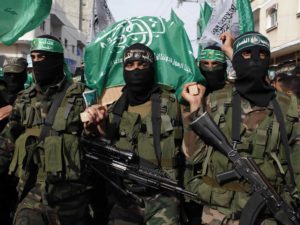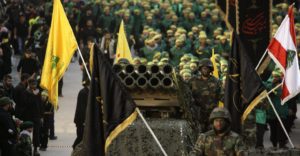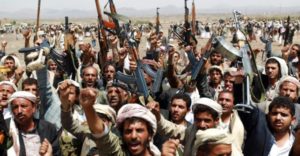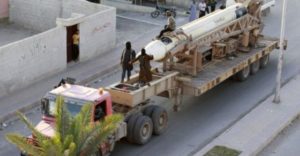In addition to state actors, non-state actors, such as terrorist groups or self-determination movements, also pose a missile threat to the United States, its partners, and allies. Mostly concentrated in the Middle East, these groups have recently demonstrated an ability to acquire and use ballistic missiles obtained from either state sponsors or leftover stockpiles in failed states. In addition to missiles, these groups also pose a significant rocket and mortar threat, and the unpredictability of their operations make them more difficult to defend against than state actors.
The Taliban 
The Taliban is a terrorist organization that developed from the Mujahideen in Afghanistan during the 1980s. This group resides in Afghanistan, and has recently become more prevalent since the US pulled out of the country in 2021. The Pakistani sect of the Taliban has the goal of overthrowing the Pakistani government. They operate primarily on the parts of Pakistan close to the Afghan border and hold strong ties and allegiance to the Afghan Taliban. Recently in 2015, they attacked a Pakistani Air Force base Minhas in Kamra housing connected to their nuclear program.
Hamas
Hamas is a Palestinian Islamic resistance movement located primarily in the Gaza Strip. Hamas is tied to Sunni Islam and the Muslim Brotherhood. The group is one of two Palestinian political parties, with the other being Fatah. In 1987 Hamas was founded as the main military resistance against Israel during the first Intifada. The groups mission calls for rejecting all agreements made between the Palestinian Liberation Organization (PLO) and Israel and to establish an Islamic Palestinian state in the place of Israel.
Click here to learn more about Hamas.
Hezbollah
Hezbollah is a Shiite Muslim political party and militant group that the United States and European Union consider a terrorist organization. Hezbollah’s objective is to destroy Israel and to create a fundamentalist Islamic state in Lebanon. Hezbollah has also played a key role in the Syrian conflict by supporting the Assad regime. Hezbollah receives significant support from Iran, and has a growing arsenal that may be unmatched by any non-state actor.
Click here to learn more about Hezbollah.
Hezbollah’s Rocket Capabilities
| Name | Weight | Length | Warhead type (High Explosive) | Range |
| Fajr-1 | 19 kg | 0.841 m to 0.92 m | 8 kg | 8-10 km |
| Falaq-1 | 111 kg | 1.32 m | 50 kg | 10-11 km |
| Fajr- 2 | 255 kg | 1.82 m | 120 kg | 10-11 km |
| Shahin– 1 | 384 kg | 2.9 m | 190 kg | 13 km |
| Fajr-3 | 407 kg | 5.2 m | 45 kg | 43 km |
| Fajr-5 | 915 kg | 6.485 m | 90 kg | 75 km |
| Raad-2 and Raad-3 | 280 kg | 4.8 m | 50 kg | 60-70 km |
| Khaibar-1 | 750 kg | 6.3 m | 150 kg | 100 km |
| Zelzal-1 | 2,950 kg | 8.325 m | 600 kg | 125-160 km |
| Zelzal-2 | 3,400 kg | 8.325 m | 600 kg | 210 km |
| Fateh-110 | 3,450 kg | 9 m | 450-500 kg | 250-300 km |
| Scuds | 5,400-6,500 | 10.3-12.29 m | 600-985 kg |
Hezbollah Missile Inventory
| Name | Type | Weight | Length | Warhead Type (High Explosive) | Range |
| Khalij Fars | Antiship | 650 kg | 8.86 | 650 kg | 300km- 700 km |
| Yakhont | Antiship | 3,000 kg | 8.6 m | 200 kg | 300 km |
| C- 802/Yingji-2/Noor | Antiship | 715-800 kg | 6.39 m | 165 kg | 120 km |
Houthis
Houthi forces, after raiding Yemeni government military bases over the past few years, have acquired a stockpile of possibly more than 60 missiles and rockets. Short-range tactical ballistic missiles, including the Soviet Scud-B and C, North Korean Hwasong 5 and 6, the Soviet Tochka – as well as rockets – continue to be launched from Yemen into Saudi Arabia – a key U.S. ally in the Middle East. Houthi forces also appear to have taken Soviet SA-2 SAM missiles and re-worked them as effective anti-ground targets, dubbing the new missile “Qaher-1.” Recently, reports indicate that Houthis have acquired Iranian Zelzal-3 missiles which they have begun firing into Saudi Arabia.
Click here to learn more about the Houthis.
The Islamic State of Iraq and Syria
The Islamic State of Iraq and Syria (ISIS), also referred to as the Islamic State in Iraq and the Levant (ISIL), is a Sunni Muslim terrorist group that derived from al-Qaeda in Iraq in 2006. ISIS’ presence has grown in the Middle East and Northern Africa over the last few years, and they have increasingly incited sympathizers to carry out attacks across the globe. ISIS controls a significant amount of land in Northern Iraq and Eastern Syria and has undoubtedly played a major role in destabilizing the already volatile Middle East.
Click here to learn more about ISIS.
Recent News
US launches retaliatory strikes on Iranian-linked militia targets in Iraq and Syria
- CNN: The US conducted major airstrikes on 85 targets in Iraq and Syria on Friday, the start of what will likely be a series of larger-scale US strikes on Iranian-backed militias who have carried out attacks on US troops in the Middle East.
Click here to read more
Navy destroyer shoots down a Houthi-claimed missile in the Red Sea
- Stripes: An anti-ship cruise missile launched this week from Houthi-controlled territory in Yemen was targeting the Navy destroyer that shot it down, making it the second militant attack on a U.S. warship patrolling in the Red Sea in recent days.
Click here to read more
Islamic Resistance in Iraq claims responsibility for the attack on US Al-Tanf base
- Middle East Monitor: The Islamic Resistance in Iraq yesterday claimed responsibility for the attack on the American Al-Tanf base between Syria and Jordan, which resulted in the death of three American soldiers and wounded 25 others.
Click here to read more
Yemen’s Houthi rebels say they attacked US warship without evidence; American official rejects claim
- ABC News: Yemen’s Houthi rebels have said they attacked a U.S. Navy mobile base at sea without offering evidence, something immediately rejected by an American defense official.
Click here to read more
Hezbollah unleashes Falaq-1, battle-tests new capabilities
- Al Mayadeen: In support of the Palastinian people and their Resistance, Hezbollah launched multiple attacks on Israeli military sites in occupied Lebanese and Palestinian territories on Friday.
Click here to read more




